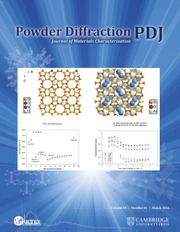Crossref Citations
This article has been cited by the following publications. This list is generated based on data provided by Crossref.
Rashmi
and
Dhawan, U.
2002.
X-ray powder diffraction study of ZnGa2Te4.
Powder Diffraction,
Vol. 17,
Issue. 1,
p.
41.
Rashmi
2003.
X-ray powder diffraction study of defect-tetrahedral structure quaternary compound CuZnGa3Te6.
Powder Diffraction,
Vol. 18,
Issue. 3,
p.
263.
Ramasindarum, Chanthiriga
Balakrishnan, Vengadaesvaran
Abu Kasim, Noor Hayaty
and
Yarmo, Mohd Ambar
2013.
Characterization and Development of Biosystems and Biomaterials.
Vol. 29,
Issue. ,
p.
153.


